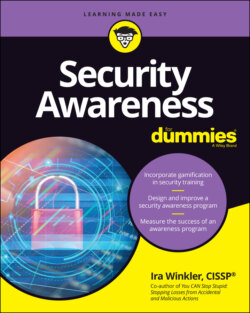Читать книгу Security Awareness For Dummies - Ira Winkler - Страница 12
Reducing losses from phishing attacks
ОглавлениеPhishing attacks are common enough these days that many people are already familiar with the term. A working definition is “an email message that intends to trick a user into taking an action that is against the user’s interests.” A phishing awareness program would ideally train people to properly determine how to handle incoming emails in a way that reduces the likelihood of loss. For example, if a message asks for the disclosure of information, the ideal situation is that a user knows what information they can disclose and to whom while also determining whether the sender is valid. Chapter 6 discusses this topic in more detail.
To appreciate the losses that a phishing attack can cause, consider these prominent attacks:
Sony: The infamous 2014 Sony hack, which was reportedly perpetrated by North Korea, began with a phishing attack. The hack resulted in the leak of information about movies, the movies themselves, and embarrassing emails. Sony reported costs of the hack to be $35 million.
Target: The 2013 Target hack, which compromised more than 110 million credit card numbers and consumer records, began with a phishing attack of a Target vendor. Target reported the resulting costs to be $162 million.
OPM: The attack on the Office of Personnel Management (OPM), discovered in 2014, which compromised the security clearance files of 20 million US government employees and contractors, began with a phishing attack against a government contractor. The costs and losses are immeasurable because this attack is considered a major intelligence success for China, the perpetrator of the attack named by the US government.
Colonial Pipeline: The Colonial Pipeline ransomware attack in 2021 began with a phishing message that captured user credentials and allowed the criminals to establish a sustained presence on the network. This allowed the criminals to find the most critical systems and eventually install the ransomware, which caused Colonial Pipeline to shut down the pipeline, halting a primary oil delivery to the US east coast. Colonial Pipeline paid the criminals approximately $4.4 million, but the actual costs resulting from the shutdown were tens of millions of dollars to Colonial Pipeline and an incalculable cost to the economy.
The Verizon Enterprises Solutions’ Data Breach Investigations Report, commonly referred to as the DBIR, is one of the most often cited studies in the cybersecurity field. The report, which is produced annually, is drawn from data collected directly by Verizon’s managed security service. The DBIR, considered a reliable overview of real-life attacks against organizations around the world, indicates that more than a whopping 85 percent of all major attacks begin by targeting users. You can access the report at www.verizon.com/business/resources/reports/dbir.
